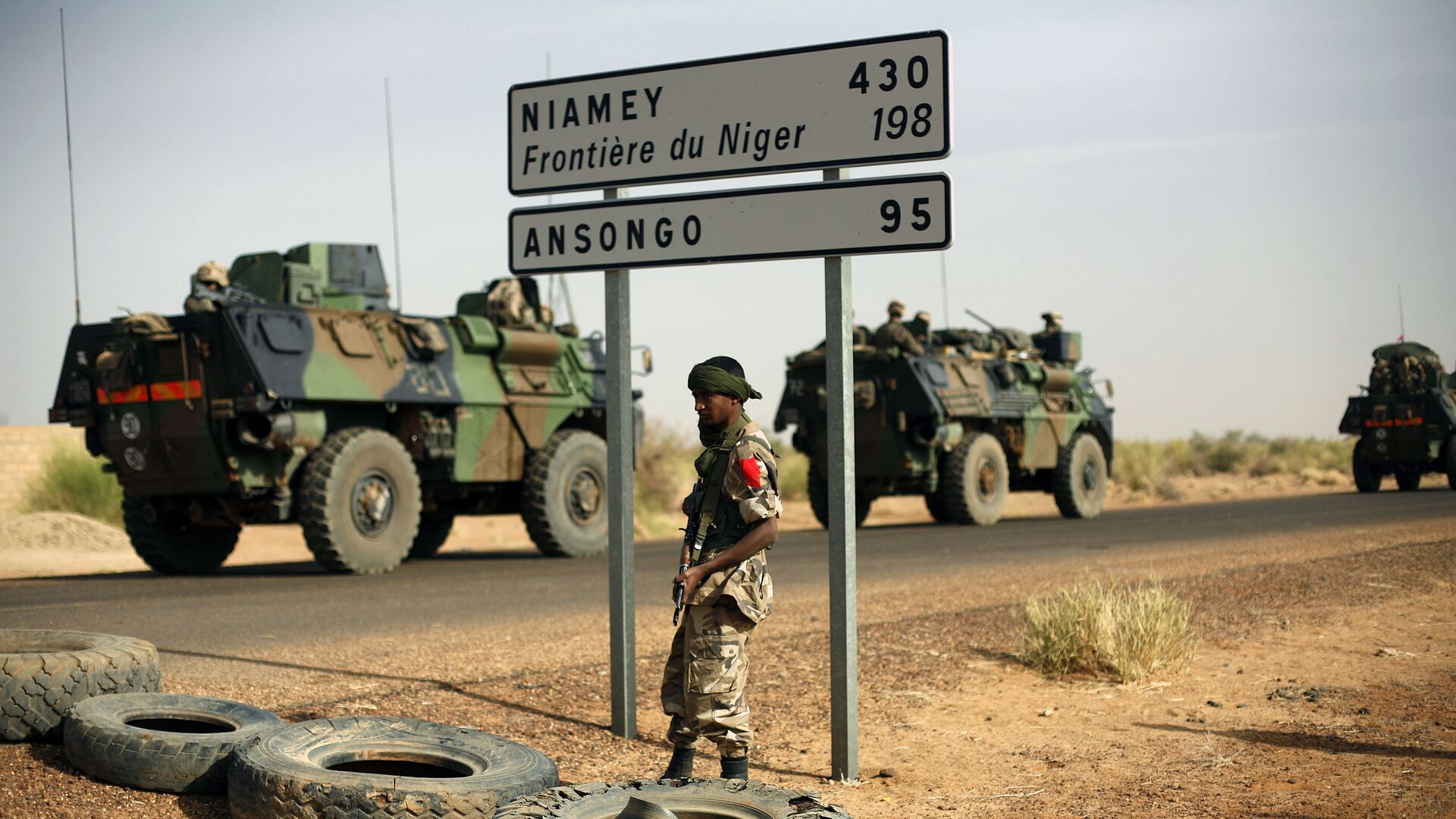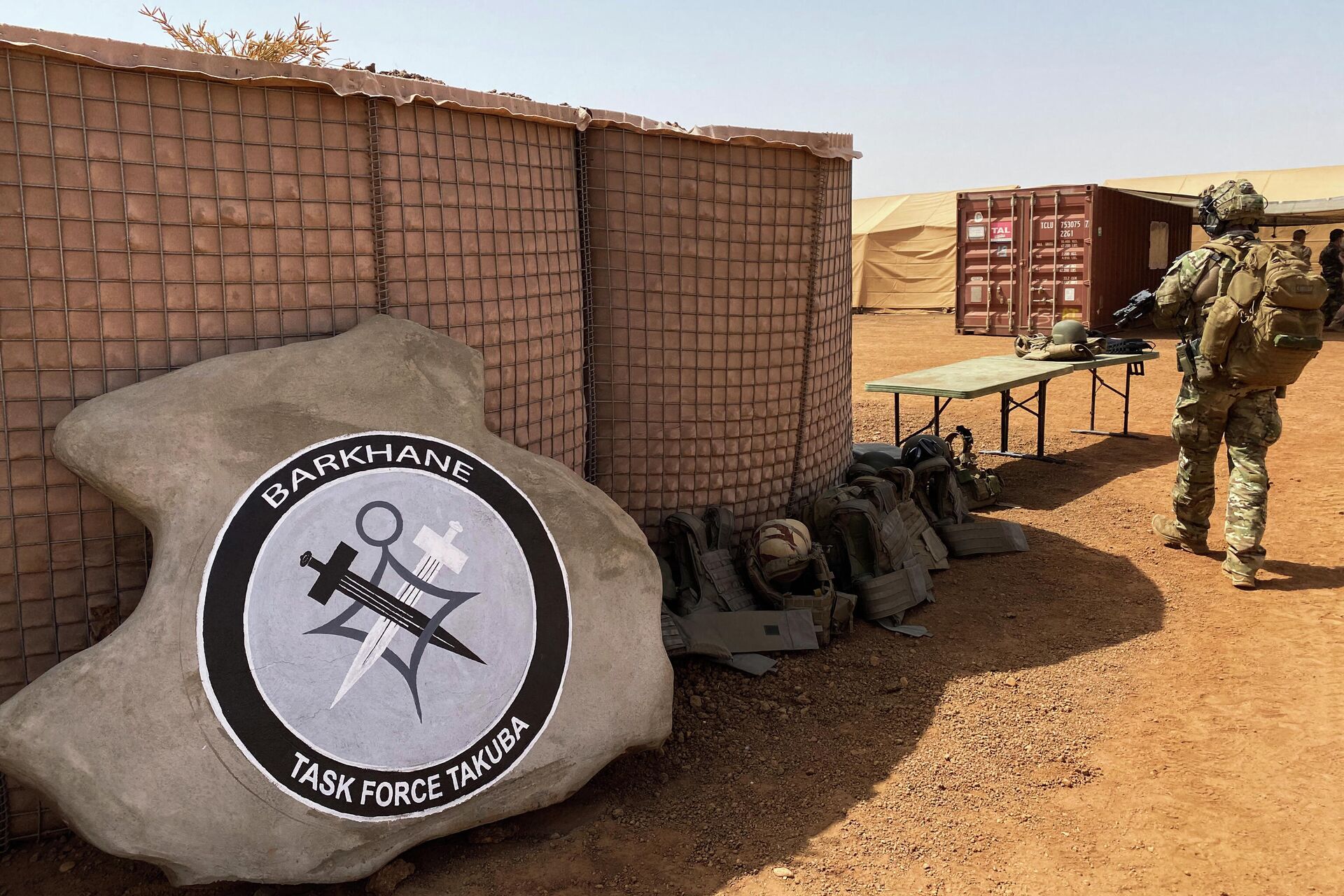Videos: Two Killed in Niger by French Army Convoy in Latest Protest Against Paris’ Forever War
22:43 GMT 29.11.2021 (Updated: 11:35 GMT 23.11.2022)

© AP Photo / Jerome Delay
Subscribe
At least two people are dead in western Niger after a French military column en route to eastern Mali was halted by protesters opposed to the French presence in West Africa. The same convoy was accused of shooting four demonstrators in Burkina Faso just a week earlier.
According to Agence France-Presse, the convoy of some 100 French military vehicles had previously arrived in Cote D’Ivoire and was en route to the French garrison in Gao, Mali, where the French Army is regrouping forces used in Operation Barkhane as Paris downsizes its operations and shifts them southward.
“The convoy of the French Barkhane force escorted by the national gendarmerie was blocked by very violent protesters in Tera in the Tillaberi region, where it had spent the night,” the Nigerien Interior Ministry said in a statement.
“In its attempt to break free, it used force,” leading to “the deaths of two people and 18 wounded”, including 11 seriously, the ministry added. "An investigation has been opened to determine the exact circumstances of this tragedy and determine responsibility."
Video from the protests showed a crowd several dozen yards from the vehicle column chanting “we don't want you” and “go home.” Smoke can be seen billowing from beside the convoy, originating from an unknown source.
The French military convoy was blocked last week by protesters in Burkina Faso, now met with further resistance and protests in Niger.
— ronny🇧🇮 (@ronnyrxck) November 29, 2021
Glad to see these demonstrations against France neocolonialism. The French is quickly losing political ground in the Sahel. pic.twitter.com/l2laW8Z8ZH
Téra, la population face à l'armée française.
— Président 🇳🇪 2050 (@amadou_ne) November 27, 2021
La situation s'envenime. Les risques de dérapage s'accentuent #Niger #Barkhane pic.twitter.com/4BClTyhTGC
“No French soldier was wounded,” French army spokesperson Pascal Ianni told AFP on Saturday. However, “two civilian drivers in the convoy were hurt by stones and some civilian trucks were damaged,” he added.
“The convoy halted last night at Tera. This morning, when they wanted to continue the road to Niamey, they were stopped by 1,000 demonstrators and a violent group among them tried to take over the trucks,” Ianni said, adding that Nigerien gendarmes had fired tear gas to disperse the protesters. However, he said that after that, “tensions soared again” and the gendarmes and French soldiers “fired warning shots.”
Video uploaded onto social media shows three people with bloody chest wounds being carried away from the protests. Warning: the video might offend the sensibilities of some viewers. See it here.
Other videos posted on social media seemed to show a French Mirage 2000 strike aircraft dropping either flares or tear gas bombs in a high-speed, low altitude pass over the protesters.
مقطع مصور لاستخدام الجيش الفرنسي طائرات محملة بالغاز المسيل للدموع لمواجهة المحتجين ضد وجودها العسكري في النيجر.#النيجر 🇳🇪 #فرنسا 🇫🇷 pic.twitter.com/j7HrIIVatO
— أخبار #النيجر (@Nigerenarabe) November 28, 2021
This wasn’t the first time the massive convoy had encountered protests on its journey - or the first time it was accused of deploying deadly force to escape them. The demonstrations have taken inspiration from another protest movement on the other side of Africa - the #NoMore campaign against US intervention in Ethiopia and Eritrea - with locals translating it into French as the #PasPlus hashtag.
Convoy Protested Across Burkina Faso
In the week prior, the convoy also encountered protests in Burkina Faso’s capital of Ouagadougou and the western city of Bobo Dioulasso before being met on November 19 by a human barricade of thousands of people outside the northern city of Kaya. They carried signs that said "French army get out," "Free the Sahel,” and "No more French invasion and recolonization military convoy," according to AFP. Four of the protesters were allegedly shot by the French troops guarding the convoy.
“Today they shot at us with heavy weapons. They first shot in the air and after they shot and wounded people. Is that normal?” protester Mahamadi Sawadogo told the Associated Press. “You’re in our country, even though you colonized Africans there are things you must not do.”
However, the French military denied responsibility for the deaths.
"A group of protesters tried to cut through the fence to enter the area and the Burkinabe soldiers fired tear gas to disperse the crowd," a French military source told AFP. "The French soldiers fired a few warning shots over the crowd. Nobody was wounded because of the actions of the French military personnel. We do not know of any person who was wounded, even after tear gas was fired."
The French defense ministry isn’t exactly known for owning up to African civilian deaths, though. A French airstrike on January 3, 2021, on the Malian village of Bounti was found by a United Nations investigation to have killed 22 people. The defense ministry claimed the strike had hit a terrorist camp and killed 40 people, but the probe revealed the target to have been a wedding. Even after the UN report was published, Paris continued to deny civilian deaths had occurred at Bounti, saying its own fact-finding methods were superior.
A Withdrawal, But Not Really
In June, after a military coup in Mali removed the civilian president and vice president of an interim government put in power by a previous coup, French President Emmanuel Macron announced an end to the eight-year War on Terror-style campaign across West Africa known as Operation Barkhane. The campaign began in the aftermath of yet another coup in Mali, which enabled Tuareg rebels in the northeast to take over nearly half the country.
However, the war was already immensely unpopular in both France and Africa by that time, which didn’t help Macron’s popularity as he announced his intent to seek a second term as head of the Fifth Republic.

This photograph taken on November 3, 2020 shows the France-led special operations logo for the new Barkhane Task Force Takuba, a multinational military mission in sub-Saharan Africa’s troubled Sahel region made up of soldiers from France, Estonia, the Czech Republic and Sweden, amongst others, and who are due to settle at the military base in Menaka, over the next few weeks.
© AFP 2023 / DAPHNE BENOIT
France once ruled most of West Africa, including Mali, Burkina Faso and Niger, as its colonies, before they won independence in the mid-20th century. Still, France remains the dominant economic and military partner for most countries in the region, with French companies dominating Niger’s uranium mines, which supply 40% of the uranium used in French nuclear power plants.
Last week, the French Army turned over control of a second base in northern Mali to Malian forces as part of its consolidation of forces in southern Mali, near the tri-border area with Burkina Faso and Niger - including the area where the protests against the convoy took place. The new mission, with about half of the 5,000 troops used in Barkhane, is called the Takuba Task Force and is still aimed at Islamic terrorist groups.
A protest movement in Mali calling itself “Yerewolo [“the worthy sons”] Standing on the Ramparts” has long opposed the presence of French forces, and demonstrations have only intensified since the transition from Barkhane to Takuba was announced.



